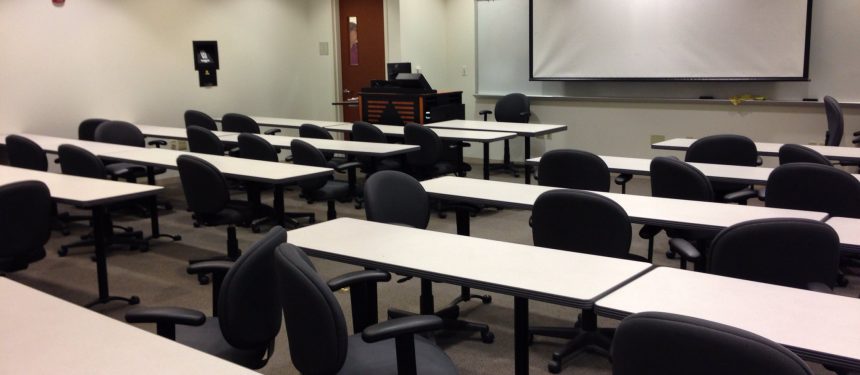An increasing number of countries are grappling with their schools temporarily closing, due to the increasing numbers of coronavirus cases. And in other countries, total bans on study abroad activity are being enacted, or postponements are being suggested.
News and business analysis for Professionals in International Education
Have some pie!
Growing list of countries close schools while foreign exchange trips under question
 Schools in many countries have suspended classroom activity for at least two weeks. Photo: Alice Keeler/Flickr
Schools in many countries have suspended classroom activity for at least two weeks. Photo: Alice Keeler/Flickr South Korea, Japan, Hong Kong, Bahrain and the UAE have joined the list of nations who have suspended in-school studies.
Italy is the latest country to join the Asian shutdown, as the outbreak grows rapidly in the country.
Japanese PM Shinzō Abe has asked all schools to close for two weeks, although he said some could choose to remain open.
In Vietnam, as of late February, schools remain closed in most cities and provinces; around 56 out of 63. Ho Chi Minh City plans to keep all schools closed until the end of March.
In other parts of Asia, schools have been closed in Mongolia (where the president has been under quarantine since February 28), South Korea, Japan and Hong Kong, with the latter having shut down schools until at least April 20th.
In the UAE, all schools and colleges – private and public – are being instructed to close for four weeks from Sunday March 8.
“[Schools] have had to adapt and respond to a situation that is changing on a daily basis”
“Member schools have been placed in a situation where they have had to adapt and respond to a situation that is changing on a daily basis,” said a spokesperson for FOBISIA, which represents 70 British-style education providers in Asia across 14 countries.
“Some schools, particularly those located in countries or hotspots considered high-risk, have been directed to close, which has resulted in them utilising their home-school learning platforms.”
“Although some very tough decisions have had to be made, the amount of goodwill and understanding to work together to safeguard students and staff has been extremely effective and impressive” added FOBISIA’s CEO, John Gwyn Jones.
From March 22, government schools in the UAE are expected to run a home-learning program called Learn From Afar, which is undergoing testing this week.
Speaking from Bahrain, Amanda Gregory, COO and co-founder of recruitment platform Univer, told The PIE News that a wider impact was on international recruitment activity.
“The biggest impact here in MENA is on the student recruitment side,” she said. “Multiple events have been cancelled, many due to government restrictions, including school visits all across the region and larger recruitment events.”
“Students in MENA apply to university late in the cycle and so the usual engagement with school counsellors, parents and students face-to-face is hugely restricted.”
Meanwhile, France and Italy have put a ban on school trips overseas, with reports of coach parties of students being prevented from leaving France after a ban was suddenly enacted at the weekend.
“I encourage the FIE family to let common sense prevail and to maintain a sense of calm”
In the USA, the Center for Disease Control & Prevention has published guidance suggesting higher education institutions consider postponing or cancelling foreign exchange programs for Americans.
“Given the global outbreak of novel coronavirus (COVID-19) institutes of higher education (IHE) should consider postponing or canceling upcoming student foreign exchange programs. IHE should consider asking current program participants to return to their home country,” it states.
Just as you challenge administration immigration decisions I think you should reach back out to the CDC on behalf of the entire field. Non specific non scientific reactions are not helpful—they merely spread fear. Universities are aware of their duties to protect their students. https://t.co/fLEpaltGij
— William L. Gertz (@BillGertz_AIFS) March 4, 2020
NAFSA’s president, Ravi Shankar, urged members to work with state and local public health officials to determine a course of action, as many already were.
One study abroad provider, FIE, emailed its customer base to confirm that programs to the UK, Ireland and Jordan were presently still running. “FIE has always taken a sensible, pragmatic view regarding critical incidents, and I encourage the FIE family to let common sense prevail and to maintain a sense of calm,” said John M Pearson, senior vice president operations.
“As I write, there are no travel restrictions against, or cautionary advisories for [those three countries].”
In China, as official numbers in the country suggest a slowdown in the spread of the virus, parents are optimistic that the return to school could happen before the end of the next month.
Schoolchildren in China won’t be happy to learn that several provinces are considering shortening summer vacations to make up for the time lost at school since the beginning of February.
Education regulations in China are decided at a provincial level, meaning different areas will have different approaches to returning students to school, with some planning to take a staggered approach by year group.
Areas less affected by the coronavirus will likely return to school first. This follows the loosening of restrictions in some areas and more people returning to work, as evidenced by the pollution levels beginning to creep back up to their normal abnormal levels.
Still looking? Find by category:


